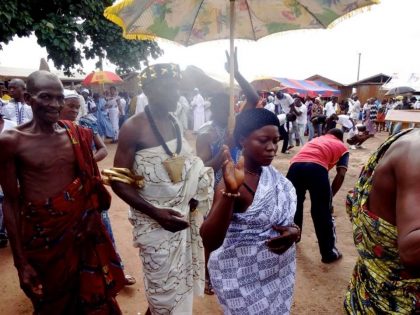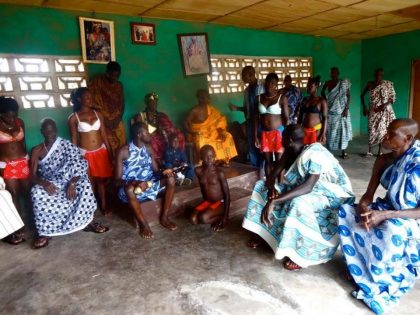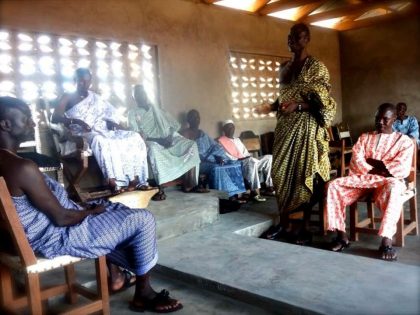This project is made possible through the partnership of WATER CHARITY and the NATIONAL PEACE CORPS ASSOCIATION. ![]()
This project has been completed. To read about the conclusion, CLICK HERE.
 Location
Location
Jamera, Jaman North District, Brong Ahafo Region, Ghana
Community Description
The village of Jamera is the cultural heart of the Nafana tribe. Swirling with red dust during the dry season and lush with jungle greenery during the rainy season, it is a rural farming village that upholds longstanding tribal customs dating back to ancient times. The Nafana people speak a tonal Senufo language known as Nafaanra.
Most of the villagers are cashew farmers, selling cashew nuts as a cash crop. Like most rural Ghanaians, they maintain subsistence farms for their families, raise farm animals if they can, and hunt and trap bush meat.
Without running water, the women and children pump water from boreholes in the ground and carry it far distances for hours every morning on their heads before school and other household duties.
The Nafana people celebrate the Sumgbee festival, a unique major festival held annually to mark the beginning of the yam season. Rife with Juju practices, offerings of libations and animals to the traditionally large and small gods, contests, royal processions, and performances, it is a thrilling and much anticipated multi-day event that reminds the people of their roots and connections and helps them prepare for the coming year.
Problem Addressed
The village of Jamera formerly had three unmechanized boreholes, which are deep holes bored into the ground, sealed and topped with a hand pump to pull the water up and into containers to carry home. Schoolchildren spend hours waiting in line to fill one bucket or headpan at a time to bring home, only to return again and again until they and their siblings have enough water for their family for the day.
Since water is life, the collecting of it takes precedence over the day’s other activities, including school. Most children are late every day to school because of this. If they know they will be too late they often do not go altogether. Much school is missed, resulting in poor grades, a mounting dislike with the educational system and all too often the eventual untimely end to their schooling for many students.
Recently one of the three boreholes tragically collapsed from longtime overuse. In a community of 3,000 people, two hand-pumped boreholes are nowhere near sufficient to serve the villagers’ water needs. Children and women now wait even longer at the two existing boreholes or must walk miles to the neighboring villages for their water. Some go to streams in the bush instead of spending hours every day waiting or walking, but this water is unclean, harboring dangerous waterborne diseases and parasites.
 Project Description
Project Description
This project is to build a new borehole and install an electric pump, tower, and storage tank.
Drilling will commence on a new site, where the community elders have already had tests run to ensure an abundance of quality groundwater. They have surveyed the land for the best possible location, one that will make water collection as efficient as possible for the people. The chosen site is spaced evenly in the village with regard to the two other safe water sources.
A team of skilled borehole professionals will use their expertise to bore a deep cylindrical hole vertically into the ground by the rotary action of an auger. Next, they will install a motor-driven submersible pump that will pump water up to a poly tank on a raised cement platform.
The community members will mold the concrete blocks and build the platform. The chiefs and elders, specifically the sub-chief in charge of community development, will oversee community participation.
The project will be directed by Ofori Aaron Atta, or “Nana Atta,” as he is known, the Ghana Country Director of Change the World of One. Nana Atta is the on-the-ground project manager of this endeavor and will manage all funds, collect all receipts, take progress photos and be onsite regularly to ensure the work is executed properly.
Water Charity funds will be used to purchase construction materials and supplies including sand, cement, gravel, a submersible motor, a poly tank, pipes, spigots, fittings, and other materials to construct the mechanized borehole.
The community is contributing to the water quality test, in-kind labor to clear the land, mold the blocks, and build the cement platform. They will also provide room and board to the borehole professionals for the duration of their stay in Jamera until the project is completed. The local chieftaincy is donating cement received from the Minister of Parliament.
Change the World of One’s contribution will help cover the cost of the skilled labor and provide for additional costs, such as transportation of materials and Nana Atta’s frequent trips to Jamera.
Project Impact
3,000 people will benefit from the project.
Project Administration
Jasmine Keefe, Returned Peace Corps Volunteer, Ghana (’11-’13), CEO & Founder at Change the World of One
 Monitoring and Maintenance
Monitoring and Maintenance
Sustainability is key to this project. The citizens of Jamera know what it is like when one of their boreholes ceases to function, and the dire situation it creates for their children. With this in mind, Nana Atta, the Country Director of Change the World of One, has been tasked with training a small task force of three community elders with monitoring and maintenance of this project. Each quarter year they will collect very small dues from each family that utilizes this new mechanized borehole. The money will be recorded and deposited in an account that will be used solely for the purpose of paying the light bill fee for the pump and as a fund for borehole maintenance and repair. Nana Atta will help set this up and will monitor the situation regularly.
Comments
Mechanizing this new borehole means that instead of the strenuous labor of pumping water from the ground by hand, it is merely a matter of opening one of four spigots and letting the water flow. This maximizes efficiency more than fourfold, allowing four people to collect water at a time instead of one, and the rate of flow will be greater, thereby drastically decreasing the amount of time each person spends collecting water each day. No longer will women and children have to walk miles to the neighboring village for water, or be forced to wait in line for hour upon hour each morning, or collect contaminated stream water. Children will be able to get to school earlier, have a more productive day and will be more likely to stay in school.
Let Girls Learn
Girls traditionally have the responsibility to provide water for the family each day. This project will drastically decrease the amount of time every day that girls have to spend collecting water. This will afford them more time each day to spend in school, increasing the likelihood that they will do well in school and continue their education.
Project Funding
The funds for this project were advanced through the generosity of an anonymous donor. If you like this project, please make a donation to Water Charity designated for use in our programming in Ghana, and your contribution will be so attributed.